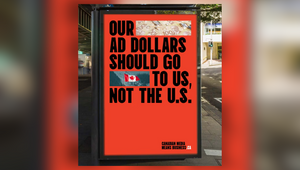
How Loyle Carner Wove the ‘Fabric of a Champion’ with His Words

The hooded sweatshirt first appeared in the 1930s thanks to Champion, the global lifestyle brand born from sport. And ‘Fabric of a Champion’, the first pan-European campaign from the lifestyle brand, tells that story.
Narrated and written by award-winning UK musician and artist Loyle Carner, the film explores how Reverse Weave sweatshirts and hoodies grew from the sports fields of American colleges through to modern street culture. Loyle’s effortlessly-authentic, spoken word style delivery helps to weave the origin of the brand and fabric through time ‘from the mill to the many’.
Founded in 1919 in Rochester, New York, Champion invented the hooded sweatshirt in the 1930s which was originally developed as a warm-up or ‘sideline’ garment to keep athletes warm. From the 1930s to today, Champion’s premium sweatshirts and hoodies are underpinned by Reverse Weave engineering, a premium design construction technique that prevents shrinkage by flipping the fleece upright and cutting it on the cross-grain.
The ‘Fabric of a Champion’ film follows the journey of the original grey hoodie through generations from college sport to friends and lovers. Starting in Rochester, NY, we see the origins of the brand evolve as the ‘mark of a champion’ is first woven into the fabric.
The narrative picks up pace as we weave through history and culture, moving through love, life, sport, art and music. The vivid cultural tapestry of Champion’s history is drawn before our eyes and stitched together with the words of Loyle. The piece ends on the transcendent line of ‘so go forwards’, alluding to over 100 years of heritage that Champion has been built on, and calling upon the next generation to show us the way.
Paul Mallon has been senior manager for brand strategy and creative content at Champion for six months. The brief he got was pretty straightforward: "Other brands are stealing our thunder in terms of sweatshirts. How do we get our thunder back?"
“We make incredibly high-quality sweatshirts built on Reverse Weave technology. But other brands are weighing in on the space. So, how do we let people know that we're the heavyweights of this sweatshirt game? How do we double down on it when perhaps we’ve been distracted by other things?”
Paul and his colleagues briefed five agencies and ran a pitch; NYNEX from Manchester won it. “They’re a small agency with a very elegant thought, which was ‘Fabric of a Champion’,” says Paul. “It’s a line we loved. How do we tell the story of the brand from the point of view of the fabric itself?”
Although the brief was product-led, NYNEX’s strategic setup was, “Sometimes the product is the brand.” Paul speaks about how the team there used examples like Levi’s as a shorthand for jeans or Calvin Klein for underwear, brands like Yeti or Stanley for cups. “We wanted that same read: when you think of Champion at its best, you think of sweatshirts and hoodies,” says Paul. “So, it’s a brand campaign. It’s a product campaign. That was the central idea informing everything we do.”
But while the fabric itself would star in the campaign, with high-res close-ups of seams allowing the audience to get a good look at the quality of the Reverse Weave approach, that story needed a human voice. NYNEX suggested Loyle Carner, someone Champion had already been speaking to. The Mercury-nominated musician and artist ended up writing the script and appearing in the film. “He put words to the story of the fabric in a non-conventional way, which I think is really interesting and different,” says Paul.
One of the biggest challenges was having Loyle as the voice. “You’re trying to bring four key markets with you. We know Loyle resonates incredibly well in the UK, and he plays festivals around Europe. But then we had to bring the teams from Italy, France, and Germany on board,” says Paul. They considered American celebrities, French rappers and more. “Yes, there were other names in the mix. But at some point, you have to feel confident in your decision. We had someone who loves the brand, someone we’d already been talking to, and who had also been suggested by the agency.”
Consumer insights backed that up – he tested really well in other markets. “In Milan, for instance, even people who didn’t know him recognized he was a person of substance and brought something additional to the campaign,” says Paul. “It’s not about saying the hook is Loyle; people understand that the star is the story of the fabric and Champion, narrated by someone. We’ve really tried to land that point. The challenge, though, was getting a big business with territories all over Europe to align with using a UK voice. That feels like a traditional decision in some ways, and you have to back it up. A lot of work went into that, because talent and fashion are hugely subjective areas – it comes down to style and taste. But we’re very happy with the decision, and we feel like it’s going to stick.”
He talks about how Loyle’s involvement changed the shape of this project and how it came together. “We created the film in an Attenborough-style. Loyle watched the film and narrated over it, rather than starting with the script,” he says. The director's treatment was all they had going into the shoot, but the spoken-word aspect came from him. “We made a few changes with his input. It was quite a collaborative, co-signed process,” says Paul.
The final narration speaks to the history of the Champion brand, from conception to its place in youth culture. Loyle narrates: “The Fabric of a Champion whilst fearless is not without sacrifice. To weave names throughout history, torches are carried, passed from hand to hand. To carry love in defeat, so all is not lost.”
The film was shot over five days across London, Paris, and Manchester. Loyle’s scene was the last to be filmed on “a freezing November morning in Hackney Marshes,” remembers Paul. “He cycled to the set, did his work, and cycled home – just an incredibly down-to-earth guy. During the shoot, while he was sitting at the end scene in Hackney Marshes, people were stopping on their bikes, saying, ‘All right, Loyle?’ People recognized him, knew him, but it wasn’t about star power. He feels like someone who’s real and grounded. That was a great memory – seeing why we wanted him. He’s someone with texture, grit, and substance. It was backed up in those moments. He wasn’t showing up as a diva; he cycled to the set, wearing a grey hoodie, and looked great in it.”
The team at Champion knew that with someone who’s strong culturally and socially like Loyle, launching with an online film was the best way to get the campaign out there. “We wanted to avoid the melee of Black Friday and Christmas messaging because this isn’t a Christmas campaign – it’s a product-brand campaign,” says Paul. Out of home will likely follow, but the initial focus is pushing this film on social channels, focusing on key cities: Paris, Milan, London, and Berlin. “We’re targeting those four territories to get as many eyeballs as possible on the core messaging, bedding in the line ‘Fabric of a Champion’.”
From there, he says the plan is to go locally into each city: ‘Fabric of Berlin’, ‘Fabric of Paris’ etc. with separate community-based ideas for each. “We’ll work with talent from those places to talk about why they represent the fabric and substance of their cities,” Paul says.
“Champion has been very present in the culture I grew up around,” said Loyle Carner in a statement from the brand. “With the words, we were trying to say how it feels to be a link in that chain. If the only constant is change, you’ve got to evolve or be extinct.”















